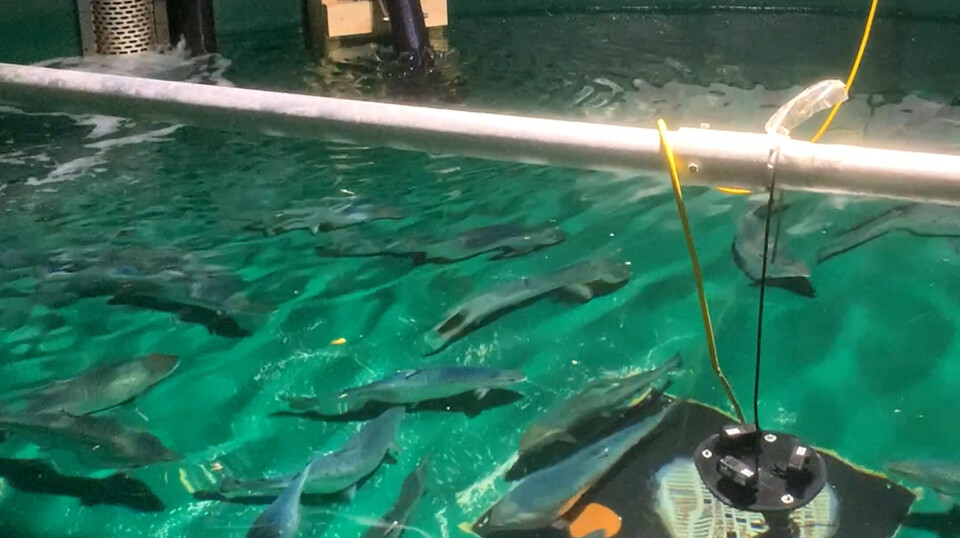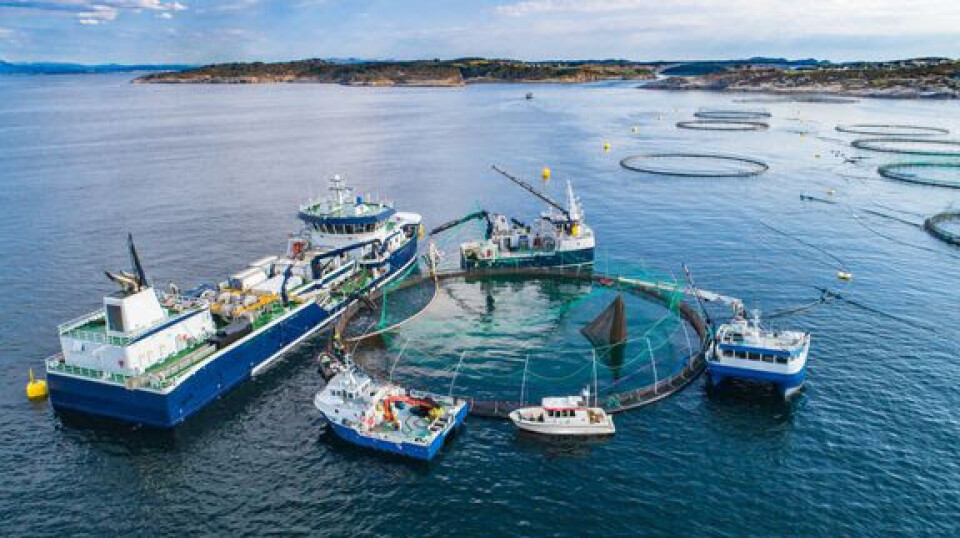
Human-made noise stresses salmon and can hinder development
New research shows that human-made noise can lead to poor fish welfare and affect salmon growth and reproductive ability.
Aquaculture fish live in an environment characterized by a lot of human-made noise and sound. They hear people walking on the edge of the cages, pumps and boats, and if the facility is close to land or is land-based, there may also be cars and construction work nearby, reports the Norwegian university NMBU in a press release.
Does it negatively affect the fish?
Does the fish get stressed by sporadic sounds?
- Many breeders are concerned about whether the fish get stressed by such sounds, so we have tried to find out, says Associate Professor Marco Vindas at the Veterinary School, NMBU.

He has researched both sporadic sounds that the fish are not prepared for, and sounds that the fish hear often.
- Probably the fish are used to people walking around the aquaculture facility and talking, and the pump that always comes on at the same time. But the sound that only occurs once in a while may be experienced as stressful and frightening.
Sound reminiscent of predatory fish
The project he leads has initially been about finding out what salmon can hear, at what frequencies these sounds are, and how it affects the salmon's behavior, stress level, and brain.
In the first study, the researchers conducted an experiment at the Matre Research Station in Vestland.
- We used low-frequency sound because we know from nature that it affects the salmon, says Vindas.
The researchers exposed the fish to a sound that they created using a machine that moved up and down in the water to create sound waves.
Vindas explains that the waves that occur when something moves in water are actually low-frequency sound.
- When a predatory fish swims, the sound of the waves comes first. The predatory fish thus reveals that it is on its way through the sound waves it creates, and then the salmon knows it needs to get away. Therefore, we know that such low-frequency sound stresses the salmon.
Tested whether the fish could get used to the sound

The experiment lasted one and a half months and involved exposing the salmon to the same sound several times, at the same time and for the same duration each time.
The researchers took samples of the fish's blood and brains before the experiment started, after they had heard the sound once and then after they had heard it 10, 20, and 30 times.
- We wanted to understand both what happens the first time they hear the sound and what happens over time. Can they get used to it if the same type of sound always occurs at the same time? And how long does it take to get used to it?
Swam away from the sound source
Regarding the fish's behavior, they saw that they responded strongly and tried to get away from the sound source the first time. Over time, the reactions became less.
- We do not know if it is because they have become accustomed to the sound or because they have learned which area the sound occurs in, and therefore stay away from that place. For the fish that were near the sound source, they reacted just as strongly each time, explains Vindas.
Decrease in stress response
To find out if the fish experienced stress, the researchers measured the level of the stress hormone cortisol in the blood.
- The first time they heard the sound, a severe stress response occurred, but after they had heard the sound 10 times, there was a significant decrease. And after they had heard it 20 times, the cortisol level was almost back to normal, as it was before the experiment started.
The brain is affected by stress
Both the behavior of the salmon and the stress levels suggest that the fish can quickly get used to sounds, but the investigations of the fish brains showed a more lasting impact.
- When we look at individual parameters, we see that the stress is more prolonged than we initially thought, says Vindas.
Several of the brain areas affected by stress were quite active throughout the experiment.
- We see that the expression of the various genes related to growth and reproduction is inhibited.
He explains that it is too early to say exactly what impact this may have on growth and reproductive ability, but that these changes in the brain suggest they are being affected.
Associated with brain disease and 'loser fish' Additionally, the researchers saw that several areas in the brain had elevated levels of the neurotransmitter serotonin.
An imbalance in the serotonin system can lead to many different diseases, especially diseases related to brain health, he says.
Serotonin is a substance that affects growth, sleep, regulation of emotions, and appetite among other things.
One of the areas in the brain that had elevated serotonin levels is an area that has been little researched so far, so the researchers cannot yet definitively state what consequences it may have.
But we know that elevated serotonin levels in other areas of the brain lead to problems. And if the fish has it over a longer period, it can lead to so-called 'loser fish'. These are small fish with poor growth, and they have a chronically elevated serotonin level, explains Vindas.
Negative for Fish Welfare
He believes it is clear that sporadic sound is worse for the fish than consistent sound, and it is only partially possible for the fish to get used to sounds.
- Even consistent sound at the same time, as we used in this study, negatively affected the fish, indicating that the welfare of the fish deteriorates from being exposed to man-made sound.
He explains that the first time the fish hears a sound, the sound has a 100% negative impact on it. Over time, the impact decreases to about 50%.
- It is a significant improvement, but it is still bad for the fish's welfare. It is conceivable that the fish could get used to sounds in the long term, but it will depend on what type of sound it is and how intense it is.
Affects Wild Fish Too
The research is based on the aquaculture industry's need to know how sound can affect the development and health of farmed fish, but Vindas points out that the findings are also relevant for wild fish.
- When we know that human-made noise, especially sporadic noise that comes out of the blue, can affect fish growth and reproductive ability, it is clear that it is also relevant for wild fish that are near a fish farm or other places where there is a lot of human-made noise, writes NMBU.






















































